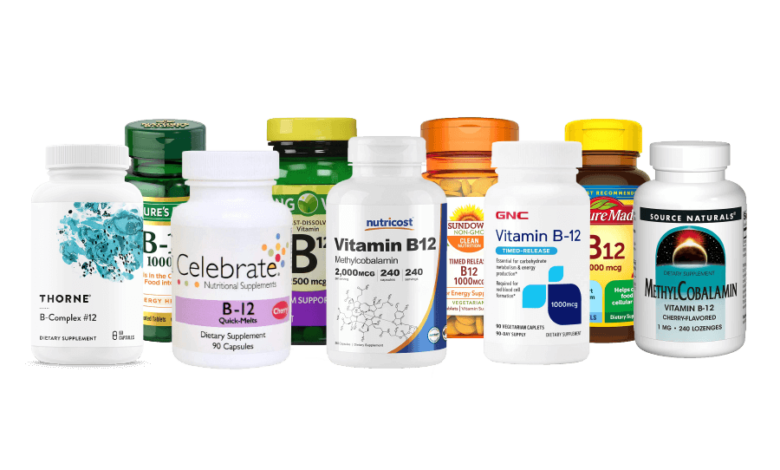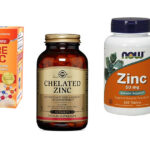How Much Vitamin B12 Is Safe To Take Daily?

Vitamin B12, also known as cobalamin, is naturally found in animal foods. It can also be added to foods or supplements. Vitamin B12 is needed to form red blood cells and DNA. It is also a key player in the function and development of brain and nerve cells.
Vitamin B12 binds to the protein in the foods we eat. In the stomach, hydrochloric acid and enzymes unbind vitamin B12 into its free form. From there, vitamin B12 combines with a protein called intrinsic factor so that it can be absorbed further down in the small intestine.
Supplements and fortified foods contain B12 in its free form, so they may be more easily absorbed. There is a variety of vitamin B12 supplements available. Although there are claims that certain forms—like sublingual tablets or liquids placed under the tongue to be absorbed through the tissues of the mouth—have better absorption than traditional tablets, studies have not shown an important difference. Vitamin B12 tablets are available in high dosages far above the recommended dietary allowance, but these high amounts are not necessarily the amount that will be absorbed because an adequate amount of intrinsic factor is also needed. In cases of severe vitamin B12 deficiency due to inadequate intrinsic factor (pernicious anemia), doctors may prescribe B12 injections in the muscle.
Recommended Intakes
Intake recommendations for vitamin B12 and other nutrients are provided in the Dietary Reference Intakes (DRIs) developed by the Food and Nutrition Board (FNB) at the National Academies of Sciences, Engineering, and Medicine. DRI is the general term for a set of reference values used for planning and assessing nutrient intakes of healthy people. These values, which vary by age and sex, include:
- Recommended Dietary Allowance (RDA): Average daily level of intake sufficient to meet the nutrient requirements of nearly all (97%–98%) healthy individuals; often used to plan nutritionally adequate diets for individuals.
- Adequate Intake (AI): Intake at this level is assumed to ensure nutritional adequacy; established when evidence is insufficient to develop an RDA.
- Estimated Average Requirement (EAR): Average daily level of intake estimated to meet the requirements of 50% of healthy individuals; usually used to assess the nutrient intakes of groups of people and to plan nutritionally adequate diets for them; can also be used to assess the nutrient intakes of individuals.
- Tolerable Upper Intake Level (UL): Maximum daily intake unlikely to cause adverse health effects.
The table below lists the current RDAs for vitamin B12. For adults, the main criterion that the FNB used to establish the RDAs was the amount needed to maintain a healthy hematological status and serum vitamin B12 levels. For infants aged 0 to 12 months, the FNB established an AI that is equivalent to the mean intake of vitamin B12 in healthy, breastfed infants.
| Recommended Dietary Allowances (RDAs) for Vitamin B12 | ||||
| Age | Male | Female | Pregnancy | Lactation |
| Birth to 6 months* | 0.4 mcg | 0.4 mcg | ||
| 7–12 months* | 0.5 mcg | 0.5 mcg | ||
| 1–3 years | 0.9 mcg | 0.9 mcg | ||
| 4–8 years | 1.2 mcg | 1.2 mcg | ||
| 9–13 years | 1.8 mcg | 1.8 mcg | ||
| 14–18 years | 2.4 mcg | 2.4 mcg | 2.6 mcg | 2.8 mcg |
| 19+ years | 2.4 mcg | 2.4 mcg | 2.6 mcg | 2.8 mcg |
* Adequate Intake (AI)
How Much Vitamin B12 Is Safe To Take Daily?
According to Physician Nutrition Specialists, If your B-complex contains 50,000% of the Daily Value (DV), which is 6 mcg for adults, then it has 3,000 mcg of B-12. For people without a severe B-12 deficiency, this is much more than necessary. [Note: In 2016, the FDA lowered the Daily Value for B-12 to just 2.4 mcg for most adults, but this won’t be reflected on all supplement labels until 2021. This means that your supplement actually provides 125,000% of the current daily requirement.]
Although no “Upper Tolerable Intake Level” has been established, there are risks associated with getting too much B-12 from supplements. At a dose of 500 mcg (one-sixth the amount in your supplement), an increased risk of colorectal cancer was reported in a placebo-controlled study of older people. Doses of just 20 mcg per day or higher have caused outbreaks of acne and rosacea. A high-dose B complex supplement (with 1,000 mcg of B-12) hurt, rather than helped, people with type 1 or type 2 diabetes and advanced kidney disease, resulting in a worsening of kidney function and an increase in the risk of heart attack, stroke and death.
In women who are pregnant, excessive blood levels of vitamin B-12 have been associated with an increased risk of autism in their children.
Taking some B-12 is advisable for people over the age of 50 (when you’re less able to extract B-12 from food), as well as for those taking medications that interfere with B-12 absorption (such as Prevacid, Prilosec and metformin), strict vegetarians, alcohol and drug abusers, people recovering from surgery or burns, and those with bowel or pancreatic cancer. But the amount needed to avoid deficiency is small and nowhere near the amount in the supplement you describe in your B-complex.
If you decide to take a B-12 supplement, you may want to choose one that has the right dose for you and has been tested and Approved by ConsumerLab.com. Be aware that sublingual and dissolvable B-12 supplements often contain sugar substitutes that can cause gas, bloating, and diarrhea in some people — particularly if taking multiple pills. You can use the Ingredients listings in CL’s Review to spot and avoid these ingredients. In general, it’s best to avoid excessive doses of any vitamin if it is not needed.





